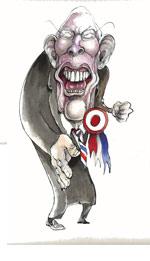End of an era as Paisley decides to step down

Former Northern Ireland First Minister Rev. Ian Paisley has announced that he will not seek re-election in forthcoming general election. He announced his decision today in his local constituency paper, the Ballymena Guardian.
The decision of the 83 year old founder and former leader of the Democratic Unionist Party (DUP) opens the way for his son, Ian Paisley Jr., to contest the election as the DUP's candidate in the North Antrim constituency.
Indeed, leading the tributes was Paisley Jr., who said: "I would want to pay tribute to the fantastic role my father has played as a member of Parliament for the last 40 years." Paisley has also called on all of those in the North Antrim constituency to support his son in the upcoming election.
However, the contest is sure to be especially fierce. Former DUP member Jim Allister has already announced he will run for Paisley's seat at the next election. Allister, now the leader of the North Traditional Unionist Voice party, is a popular voice among hardline unionists. He left the DUP after Paisley's decision to enter power-sharing with Sinn Féin.
Allister has already voiced his opinions on the upcoming election, saying: "Just as every day at Stormont, the DUP will be united with Sinn Fein in this election in defending and sustaining terrorists in government. Whichever Ian Paisley stands, that will be their primary platform, for that, tragically – after all the years of empty DUP bluster and IRA terror - is the Paisley legacy.”
Whatever Allister's feelings, however, there is no doubt that Paisley made his mark in his four decades as a Member of Parliament. With his trademark fiery rhetoric, he became a figurehead for the unionist movment in Northern Ireland. He was especially critical of the Catholic Church, calling the Pope the "anti-Christ" and saying Catholics "breed like rabbits and multiply like vermin".
This hardline stance seemed to soften in his later years. Having repeatedly said he would never enter government with Sinn Féin, he made a remarkable about turn in 2007 by accepting the position of First Minister alongside Deputy First Minister, and former IRA leader, Martin McGuinness.
The decision was lauded by moderates as a huge step towards permanent peace in the North, and Paisley was hailed as a peacemaker. However, it also alienated many of his most fervent supporters, including Allister above, and divided the unionist community in Northern Ireland. Paisley stepped down as First Minister in 2008 and was replaced by Peter Robinson.
He has since said he has "no regrets" about the decision, saying that "the overwhelming majority of the people of Northern Ireland wanted me to do the deal". He also expressed his disappointment at the subsequent schism in the DUP, but felt he achieved "the best possible deal in the circumstances".
Whatever the viewpoint on his decision in 2007, Paisley's decision to exit politics is the end of an era in Northern Ireland. There is no doubt that Paisley left his mark on Irish and British politics and, surprisingly, perhaps his legacy will ultimately be one of peace.
